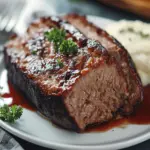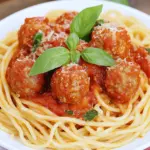Black Bean Veggie Burgers are a delicious, protein-packed alternative to traditional beef burgers. With their smoky spices, hearty texture, and just the right amount of heat, these burgers prove that vegetarian meals can be bold, filling, and incredibly satisfying. Each bite delivers a blend of beans, veggies, and spices that pair perfectly with your favorite toppings, from creamy avocado to crisp lettuce.
This recipe is also versatile and simple to prepare. Whether you grill them outdoors for a summer cookout or pan-fry them indoors, they turn out beautifully every time. Add a slice of cheese, a dollop of salsa, or a drizzle of spicy mayo for your own twist. These burgers are sure to win over both vegetarians and meat-lovers alike, making them a go-to for family dinners or casual gatherings.
Full Recipe:
-
1 (16 ounce) can black beans, drained and rinsed
-
½ green bell pepper, cut into 2-inch pieces
-
½ onion, cut into wedges
-
3 cloves garlic, peeled
-
1 egg
-
1 tablespoon chili powder
-
1 tablespoon cumin
-
1 teaspoon Thai chili sauce or hot sauce
-
½ cup bread crumbs
Directions:
-
Preheat an outdoor grill or stovetop pan for medium heat, and lightly oil the grate.
-
Mash black beans in a medium bowl until thick and pasty.
-
In a food processor, finely chop bell pepper, onion, and garlic. Stir into mashed beans.
-
In a small bowl, stir together egg, chili powder, cumin, and chili sauce. Mix egg mixture into mashed beans.
-
Stir in bread crumbs until the mixture is sticky and holds together. Divide into four patties.
-
Place patties on a greased sheet of aluminum foil. Grill about 8 minutes on each side, or until heated through and firm.
Prep Time: 15 minutes | Cooking Time: 16 minutes | Total Time: 31 minutes
Kcal: ~198 kcal per serving | Servings: 4 burgers
The Rise of the Black Bean Veggie Burger
The burger has long been an iconic staple in the global food scene, traditionally centered on beef. However, as dietary preferences have evolved, so has the burger itself. Enter the black bean veggie burger—an inventive and satisfying alternative that has gained massive popularity among vegetarians, vegans, and flexitarians alike. Black beans, with their earthy flavor and meaty texture, provide the perfect foundation for a hearty burger that doesn’t rely on animal products. Unlike many plant-based patties made from highly processed ingredients, black bean burgers often use wholesome pantry staples, making them both approachable and nourishing.
The surge of interest in meatless meals, particularly in the last two decades, has made veggie burgers a menu essential. Black bean burgers stand out because they achieve that “comfort food” satisfaction without compromising on health. They are an example of how food innovation can bridge the gap between traditional cravings and modern nutritional goals.
Why Black Beans Are the Perfect Base
Black beans are celebrated not only for their rich flavor but also for their impressive nutritional profile. High in protein and dietary fiber, they provide a satiating base that keeps you full and energized. Unlike some lighter vegetables used in patties, black beans hold together well when mashed and seasoned, offering a texture reminiscent of ground meat. Their neutral flavor also makes them a blank canvas for bold spices—think cumin, chili powder, smoked paprika, or even chipotle peppers for a smoky kick.
In addition to protein and fiber, black beans are an excellent source of iron, magnesium, folate, and antioxidants. This makes them especially valuable for plant-based diets where these nutrients can sometimes be more challenging to obtain. A black bean burger, therefore, is not just a tasty substitute for a beef patty but a nutrient-dense powerhouse that fits seamlessly into a balanced diet.
Flavor Profile and Seasoning Possibilities
One of the most exciting aspects of black bean burgers is their adaptability. Unlike beef, which has a fairly predictable flavor base, black beans can take on a wide variety of seasonings. Some cooks lean toward Latin American flavors, using chili powder, cumin, lime juice, and fresh cilantro. Others enjoy giving the patties an Asian twist with soy sauce, sesame oil, and ginger. Still, others go Mediterranean with oregano, garlic, and sun-dried tomatoes.
The versatility of black bean patties means you can tailor them to your personal preferences or the theme of your meal. Want something smoky and bold? Add chipotle peppers in adobo sauce. Looking for fresh and zesty? Toss in lime zest and fresh herbs. They are the ultimate “choose-your-own-flavor” kind of dish, making them an ideal recipe for adventurous home cooks.
Texture: The Key to a Good Veggie Burger
One common critique of veggie burgers is that they can be mushy or fall apart when cooked. With black bean burgers, mastering the texture is essential. The beans are mashed but should retain some small chunks to provide bite and contrast. A binder—such as breadcrumbs, oats, or even ground flaxseed—helps hold everything together. The cooking method also impacts texture: grilling gives a slightly charred, firm exterior, while pan-searing yields a crisp crust.
A successful black bean burger strikes a balance between being sturdy enough to hold in a bun but still tender when bitten into. When done right, it doesn’t feel like a “replacement” for a meat burger—it becomes a unique dish in its own right.
Nutritional Benefits Compared to Meat Burgers
Traditional beef burgers are undeniably flavorful, but they often come with high levels of saturated fat and cholesterol. Black bean burgers, on the other hand, provide a lighter, heart-healthy alternative without sacrificing satisfaction. With zero cholesterol and plenty of fiber, these patties support digestive health and cardiovascular well-being.
From a calorie standpoint, black bean burgers are typically lower than beef burgers, making them an excellent choice for individuals looking to manage their weight without giving up comfort food favorites. For athletes or those with higher protein needs, black bean burgers can be paired with whole-grain buns, avocado, or a side of quinoa salad for a complete and balanced meal.
Serving Ideas and Pairings
Black bean veggie burgers are incredibly versatile when it comes to serving. The classic presentation is in a bun with traditional toppings like lettuce, tomato, onion, and pickles. However, the possibilities extend far beyond the standard burger setup. For a Mexican-inspired twist, serve your patty with guacamole, salsa, and jalapeños. For a Mediterranean version, try topping it with tzatziki sauce, feta cheese, and roasted red peppers.
These burgers also shine without the bun. You can place them atop a fresh salad, serve them inside a wrap, or even crumble them over grain bowls for added protein. For side dishes, consider pairing them with baked sweet potato fries, a light cucumber salad, or roasted vegetables. The adaptability ensures that black bean burgers never feel boring or repetitive.
Cultural Significance and Growing Popularity
Black bean burgers are more than just a trend; they represent a broader shift toward conscious eating. As more people become aware of environmental and ethical issues surrounding meat consumption, plant-based dishes like these are finding their way into mainstream menus. What was once a niche option at health-food cafes is now a standard offering at many restaurants, food trucks, and even fast-food chains.
This cultural shift is also evident in home kitchens. Families are embracing “Meatless Mondays” or simply cutting back on meat consumption for health reasons. Black bean burgers offer a practical and delicious way to participate in this movement without feeling deprived. They embody the idea that eating plant-based can be flavorful, exciting, and deeply satisfying.
Tips for Making the Perfect Black Bean Burger at Home
While the recipe itself is straightforward, a few tricks can elevate your homemade black bean burgers. First, make sure to drain and dry your beans thoroughly to avoid excess moisture, which can lead to soggy patties. Second, don’t over-process the beans—leaving some texture improves the final result. Third, allow the patties to chill in the refrigerator before cooking. This helps them firm up and hold their shape on the grill or pan.
Experimentation is encouraged. Try swapping breadcrumbs with oats for a gluten-free version or adding roasted vegetables for an extra layer of flavor. The more you make them, the more you’ll discover small tweaks that suit your preferences and cooking style.
Why You’ll Keep Coming Back to This Recipe
Perhaps the greatest strength of the black bean veggie burger is its balance of simplicity and depth. The ingredients are easy to find, the preparation is straightforward, and yet the end result feels gourmet and satisfying. It’s the kind of meal that works equally well for a casual family dinner, a summer barbecue, or even meal prep for the week ahead.
Beyond convenience, these burgers deliver comfort. They offer the warmth of a home-cooked meal, the excitement of bold flavors, and the reassurance of knowing you’re making a healthy choice. Whether you’re vegetarian, vegan, or simply exploring more plant-based options, this dish has a way of earning a permanent spot in your rotation.
Conclusion
Black bean veggie burgers have rightfully earned their place as a staple in modern kitchens. They combine nutrition, versatility, and flavor in a way that appeals to all eaters—not just those avoiding meat. With their hearty texture, customizable seasoning, and endless serving options, they prove that plant-based meals can be every bit as satisfying as traditional favorites.
As food culture continues to embrace health-conscious and sustainable choices, black bean burgers stand as a shining example of what’s possible when creativity meets nourishment. Whether you’re grilling for friends, cooking for family, or preparing a quick weeknight meal, these burgers deliver on every level. Give them a try, and you may just find that this meatless marvel becomes one of your all-time favorites.






